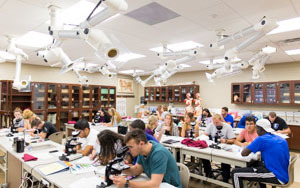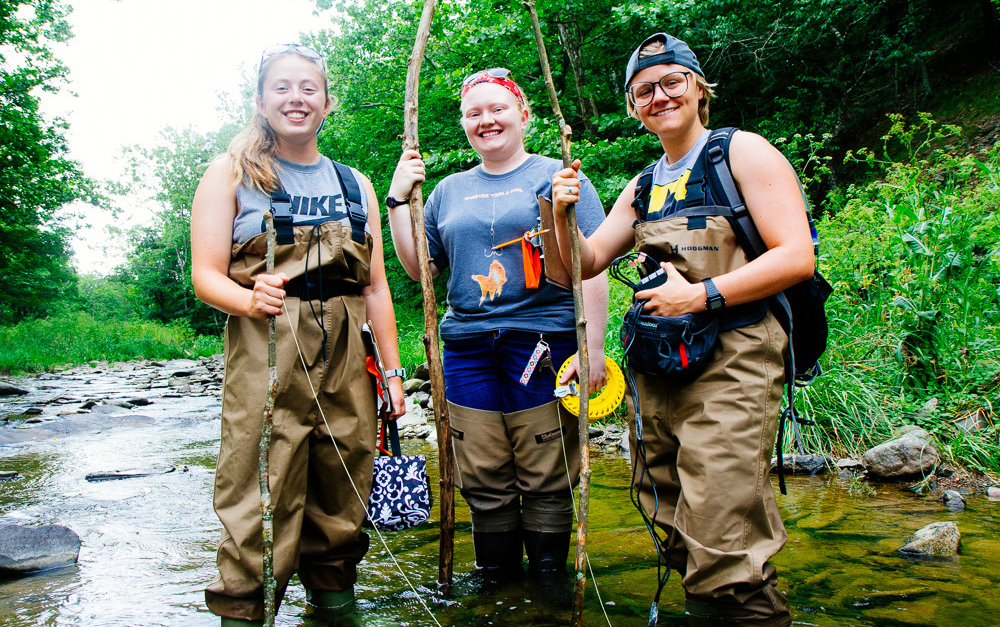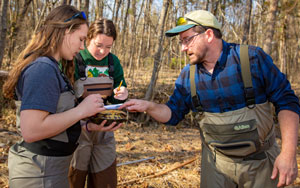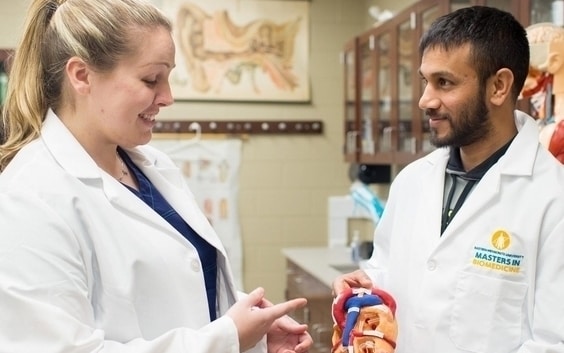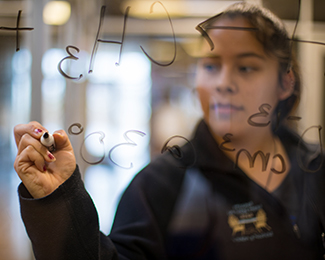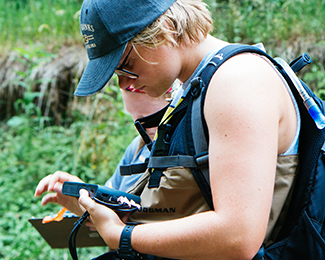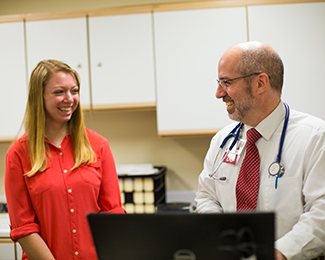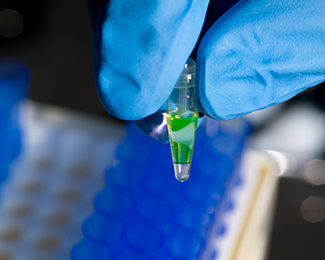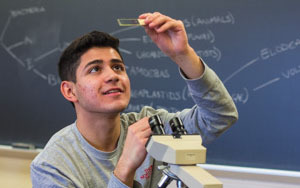Curriculum
The EMU biology program is dedicated to the investigation of life with our students,
from molecules to ecosystems, and emphasizes the skills and content knowledge required
for careers in health care and biological professions. The biology major includes
a set of biology core courses that teach the breadth of biological science, an apprenticeship
experience that allows for professional exploration, and three separate tracks plus
the option to pursue a teaching endorsement that students can select from.
Students who major in biology will select one of the tracks listed below:
General Biology Track: Students in the General Biology track are trained in all aspects of biology, from
molecular analysis to ecological field studies, and including supporting courses in
the physical sciences and math. Students completing this track have a lot of freedom
to explore different aspects of natural science while completing their requirements,
leading to a preparation for careers in various biological fields or to further graduate
study in animal physiology, botany, ecology or molecular and cellular biology. Students
in this track are also well-prepared for professional health programs including medical,
veterinary, dental, or physician’s assistant programs.
Neuroscience Track: Students in the neuroscience track explore how biology and psychology intersect -
how genes and anatomy determine emotion, behavior, and disorders. Students completing
this track are well prepared for careers or further graduate study in biomedical neuroscience,
and also for professional health programs including medical, veterinary, dental, or
physician’s assistant programs.
Pre-Physical Therapy Track: Students in the Pre-PT track are interested in how the human body works, how health
is restored after injury, and in gaining the specific skills and knowledge required
for becoming a physical therapist. These students take the exact courses required
to enter any Doctor of Physical Therapy program in the United States.
Foundational Biology Courses (27 SH)
- BIOL 173 Concepts in Biology: Unity and Diversity of Life - 4
- BIOL 215 Organismal Biology - 4
- #BIOL 220 Science Professions Seminar - 1
- BIOL 240 Molecular and Cellular Biology - 4
- BIOL 275 Writing for the Natural Sciences - 2
- BIOL 485 Science and Ethics OR *ENVS 325 Environmental Ethics - 2
- CHEM 223 General Chemistry I - 4
- CHEM 224 General Chemistry II - 4
- STAT 220 Inferential Statistics - 2
#Those seeking secondary education licensure may substitute ED 411 Reflective Teaching
Seminar for BIOL 220.
Apprenticeship experience (1 SH)
Choose one course from this list:
- BIOL 219 Life Sciences Practicum - 1
- BIOL 429 Biology Internship - 1
- BIOL 479 Biology Research - 1
- BIOCH/CHEM 479 Biochemistry/ Chemistry Research - 1
- ED 361 Content Methods PFE (Secondary education licensure students only) - 1
- PSYC 499 Research in a Neuroscience Topic - 1
- Completion of an NSF REU (Research Experiences for Undergraduates) or other program-approved
summer research programs (no credit hours received)
- 45 hours of an approved professional internship or shadowing experience
Additional General Biology Track Requirements (23 SH; 50 SH total):
- BIOL 235 Ecology: Adaptation and Environment - 4
Choose one lab course from this list:
- BIOCH 318 Biochemistry and Molecular Biology Lab - 2
- *BIOL 327 Advanced Microbiology - 3
- BIOL 437 Advanced Human Anatomy - 4
- BIOL 447 Advanced Human Physiology - 4
Choose one field course from this list:
- *BIOL 358 Natural History of the Shenandoah Valley - 4
- *BIOL 368 Blue Ridge Botany - 3
- *ENVS 379 Techniques in Environmental Monitoring - 1
- *ENVS 385 Conservation Biology - 4
- *ENVS 465 Topics in Advanced Ecology - 2
Select additional 300+ level coursework in BIOL or BIOCH to reach a total of 15 SH
when added to the BIOL 235, lab course, and field course hours as listed above. Note:
Foundational Biology Courses and Apprenticeship Experience hours may not count towards
towards this 15 SH requirement.
Choose two additional supporting science and math courses from this list:
- *CHEM 285 Environmental Chemistry - 4
- CHEM 315 Organic Chemistry I - 4
- CHEM 316 Organic Chemistry II - 4
- MATH 185 Calculus I - 4
- MATH 195 Calculus II - 4
- (PHYS 151 College Physics I OR PHYS 252 University Physics I) and PHYS 253 University
Physics I laboratory - 4 total
- (PHYS 162 College Physics II OR PHYS 262 University Physics II) and PHYS 263 University
Physics II laboratory - 4 total
Additional Neuroscience Track Requirements (26-30 SH; 53-57 SH total)
- BIOL 290 Neuroanatomy - 2
- *BIOL 451 Neuropsychology - 3
- *BIOL 478 Advanced Neurobiology - 3
- PSYC 101 General Psychology - 3
- PSYC 342 Cognitive Psychology - 3
Choose two biomedical courses from this list:
- *BIOCH 398 Advanced Cellular Biology - 3
- *BIOCH 438 Molecular Genetics - 3
- BIOL 437 Advanced Human Anatomy - 4
- BIOL 447 Advanced Human Physiology - 4
Choose two supporting science and math courses from this list:
- BIOL 235 Ecology: Adaptation and Environment - 4
- *CHEM 285 Environmental Chemistry - 4
- CHEM 315 Organic Chemistry I - 4
- CHEM 316 Organic Chemistry II - 4
- MATH 185 Calculus I (4) OR 2 additional semester hours of STAT courses (in addition
to STAT 220)
- MATH 195 Calculus II - 4
- (PHYS 151 College Physics I OR PHYS 252 University Physics I) and PHYS 253 University
Physics I laboratory - 4 total
- (PHYS 162 College Physics II OR PHYS 262 University Physics II) and PHYS 263 University
Physics II laboratory - 4 total
Students in the neuroscience concentration are encouraged to take PSYC 499 Research
in a Neuroscience Topic to fulfil the apprenticeship requirement.
Additional Pre-Physical Therapy Track Requirements (21-23 SH; 48-50 SH total):
- BIOL 437 Advanced Human Anatomy - 4
- BIOL 447 Advanced Human Physiology - 4
- MATH 185 Calculus I (4) OR 2 additional semester hours of STAT courses (in addition
to STAT 220)
- (PHYS 151 College Physics I OR PHYS 252 University Physics I) and PHYS 253 University
Physics I laboratory - 4 total
- (PHYS 162 College Physics II OR PHYS 262 University Physics II) and PHYS 263 University
Physics II laboratory - 4 total
- PSYC 101 General Psychology - 3
Students in the Pre-PT concentration are encouraged to take BIOL 219 to fulfil the
apprenticeship requirement.
* indicates the course is offered in alternate years
Enrollment in upper-level biology, biochemistry, chemistry and environmental science
courses (BIOL, BIOCH, CHEM, ENVS 300s and 400s) requires a minimum cumulative GPA
of 2.0 in all science and math courses (BIOL, BIOCH, CHEM, ENVS, MATH, PHYS). Students
who fail to earn a C- in any coursework required for their major should promptly schedule
a meeting with their advisor.



